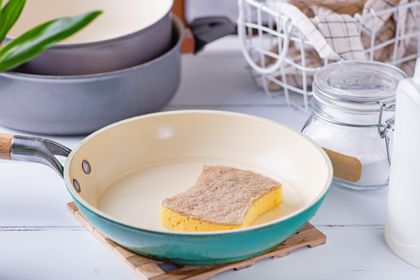If you have ceramic cookware, this article will provide you with a few tips that will help you maintain its good looks. First, make sure you avoid using metal utensils on it. Next, avoid using acids such as vinegar and salt. And finally, remember to use enzyme cleaners. And remember, salt and vinegar are terrible for cooking ceramic pans. Use the following tips and you will be sure to get beautiful pans again!
Contents
Avoid using metal utensils on ceramic cookware
Ceramic cookware is naturally non-stick, so using metal utensils can scratch the coating. In addition, if you use a metal utensil, you risk scraping the base of the pot and causing it to leach into your food. If you’re worried that metal utensils are incompatible with ceramic cookware, consider purchasing a silicone or wood utensil instead.
Ceramic non-stick cookware can withstand a hefty temperature change without cracking. However, if you use metal utensils on the surface, you run the risk of warping and scratching your cookware. And don’t forget about the dishwasher! Metal utensils can leave scratches on your ceramic cookware, so you might as well invest in a better set of cookware.
To protect your ceramic cookware, make sure to store it properly. If you have limited space in your kitchen, you should consider stacking your pans to save space. However, you should consider using potholders or folded dishtowels to protect the panhandles. And make sure to store them properly – ceramic cookware is not as durable as stainless steel or aluminum cookware.
Use enzyme cleaners
If you’re looking for an effective way to clean ceramic pans and other types of cookware, enzyme cleaners may be the answer. These powerful products have been designed to get rid of baked-on food, remove stubborn stains, and clean the inside of ceramic pans. However, you’ll need to know how to use enzyme cleaners to get the best results. Listed below are some useful tips to keep your ceramic pans clean and pristine.
Enzyme cleaners are available commercially and you can make your own. They work by speeding up chemical reactions, which help cut through food and grease. Some types of enzyme cleaners are Shout Trigger, which you can purchase or make yourself at home. Using an enzyme cleaner on ceramic pans can remove all kinds of stubborn food particles, including burnt-on bits of food. However, you’ll need to give the enzyme cleaner a month to be effective.
Avoid using vinegar
You can try to clean your ceramic pans with water and baking soda. These two ingredients can remove a stubborn food layer without harming the surface of your ceramic pans. However, vinegar is recommended for cleaning ceramic pans because it is mild and can remove stubborn food stains. To avoid ruining the surface of your ceramic pans, you should scrub them with a blunt utensil. Using metal utensils will also ruin the coating of your pan.
If you’re pressed for time and want to avoid burning the surface of your ceramic cookware, you can also use baking soda or a vinegar and water mixture. Baking soda is soft and will not damage your ceramic pan, and vinegar will lift stains. Vinegar mixed with water can also work, but it’s better not to use vinegar alone. Vinegar, especially when combined with water, can break down the resin, which is a good cleaner.
Avoid using salt
Using a soft cloth, sponge, or plastic scrub to clean ceramic pans and cookware is the most effective way to remove stains and residue from these items. Avoid using abrasive materials such as steel wool or nylon scrubbing pads on the surface of ceramic cookware, as these materials can leave scratches. Periodic deep cleaning of ceramic cookware is recommended to remove stains and maintain their attractive appearance.
To clean burned-on food particles from ceramic cookware, you can use baking soda. Simply add a teaspoon of baking soda to a bucket of warm water and scrub the pan using a soft sponge. Rinse the pan with clear water and repeat the process as necessary. If you use baking soda to clean ceramic pans and cookware, it’s important to rinse the surface thoroughly. If salt isn’t an option, you can also mix a teaspoon of the substance with a cup of water.

